Provincially and federally, Canada uses a “first past the post” political system. The party that wins the most seats in parliament forms the government. It doesn't mean that the party with the most votes across the country wins. It doesn't mean the party with the largest share of the popular vote wins. And in a multi-party system like we have in Canada, the vote can be split many ways. In the 2011 Canadian election, 39.6 per cent of the votes cast elected a Conservative "majority" government. In the Alberta provincial election of 2015, the NDP won 40% of the popular vote but 62% of the seats. The Progressive Conservatives won 28% of the popular vote but only 9 seats, while the Wildrose with 25% of the popular vote won 21 seats, making them the official opposition. If Alberta had an electoral system of proportional representation, the results would look like this: - NDP: 35
- Conservatives: 24
- Wildrose: 21
- Liberals and others:6
The map below shows countries using some form of proportional representation in colour. Nations all over the world use some form of proportional representation to ensure that a balance of views is represented. Canada, the United States and the United Kingdom are the only countries in the western world that do not practice proportional representation. Studies show that nations with proportional representation have greater equality, a better environmental track record, more representation by women and an 8% high voter turnout. To find out where Canada’s political parties stand on proportional representation, go to http://campaign2015.fairvote.ca/ (Hint: Only the Conservatives do not support it.)
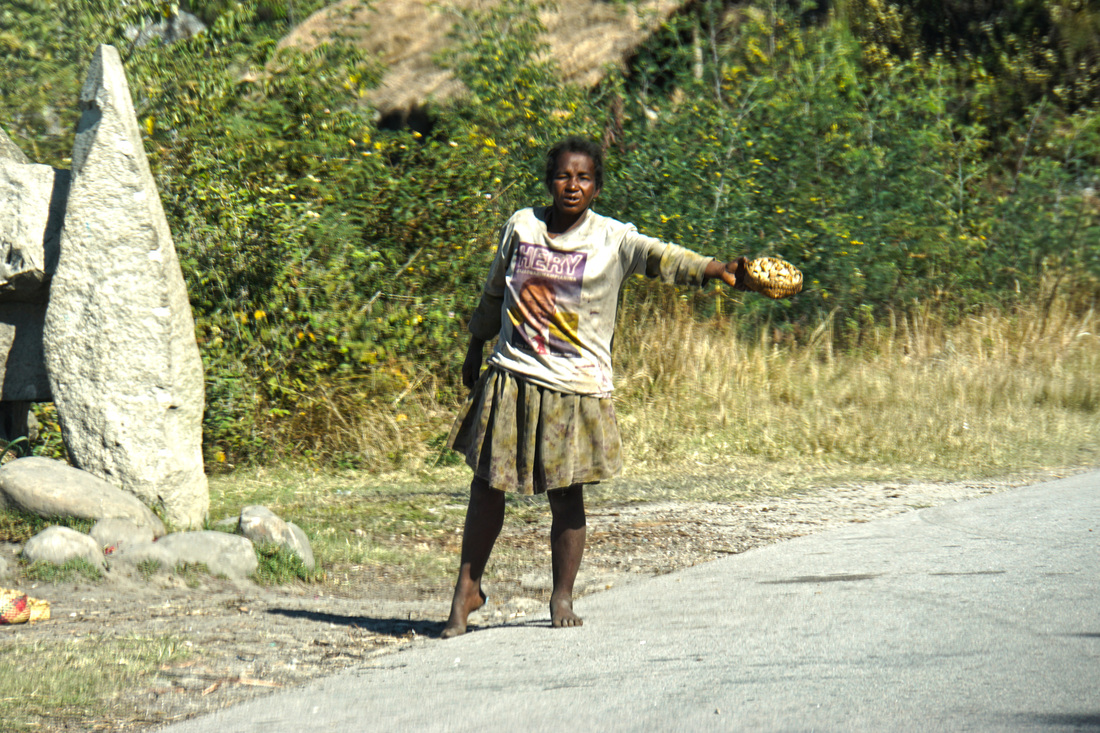 Girl selling berries, Madagascar. Madagascar is ranked 147th of 158 countries in terms of happiness Money can't buy you love, or so the song goes. But can it buy happiness? Well...somewhat. Canada is supposedly the 5th happiest country in the world according the the UN's World Happiness Report. We are a fairly prosperous nation with a stable government and lots of opportunities and abundant resources, among other things. But in 1974 economist Richard Easterlin discovered an interesting thing. While people in nations around the world generally got happier with a certain amount of money, as economies grow, they don't get correspondingly more happy. More recently Shigo Oishi, an economist at the University of Virginia found there seems to be a correlation between inequality and unhappiness. For instance, in the U.S. in the 1970s incomes were more equal and people were happier then than they are now. In a study of 34 nations he found that people in nations where income was more equally shared, people were happier. It seems that if the poor get poorer and the rich get richer, people are more unhappy. Slums and skyscrapers, Mumbai India. India’s richest 10 per cent holds 370 times the share of wealth of the poor.
World map, adjusted for income inequality. Produced by worldmapper.org
What do you think?
One of the last places we stopped before we left Madagascar was the pharmacy. My friend Kathy told me that all the expats stop there before they go home to buy worm pills. “Take one before you get on the plane,” she said. “By the time you get home, all traces of Madagascar’s nasties will be gone.”
I dutifully took the pill just as we boarded our Air France jet. But two weeks later, I find that all traces of Madagascar are not gone. The parasites left by contaminated drinking water and food may have left my body, but the country and its people are very much on my mind.
Madagascar is an island off the coast of Africa, sometimes called the world’s eighth continent because it is so large. Colonized by the British and then the French, it was controlled by a Marxist regime that saw industrial production decline by 75%, resulting in the nation becoming bankrupt. Years of political instability, two coups and an assassination have contributed to the poverty, as international agencies, the World Bank, the IMF and many multinational corporations withdrew after the 2009 coup.
Today, despite an abundance of natural resources, it is one of the poorest countries in the world. Its unique ecosystem is gradually being destroyed due to slash and burn agriculture, leading to the extinction of many species found nowhere else on earth. It has the seventh highest murder rate in the world. Theft is commonplace. Teen pregnancy and overpopulation are major issues. Most Malagasy do not have running water, access to healthcare, or adequate nutrition. Half of its children suffer from stunting because they do not get enough to eat.
What causes poverty? A visit to Madagascar indicates it is not laziness. Here, we see barefoot men run, pulling passengers on “pousse pousses” (rickshaws). We see young boys carrying impossibly huge bags of charcoal on their backs. We see small children filling potholes on the road, begging for a few cents from passing truckdrivers as a means of payment. We see women and children toiling in the fields night and day, with no machinery of any kind.
I look forward to sharing what I have learned about Madagascar and other wonders of the world with my students over the coming year.
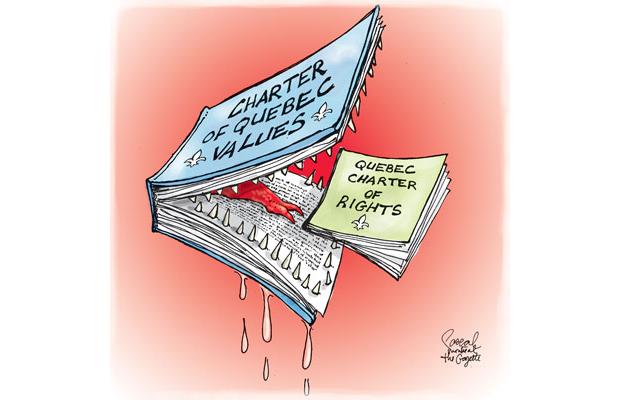
Cartoon by Pascal of the Montreal Gazette.http://www.montrealgazette.com/index.html
This cartoon by cartoonist Pascal from the September 13 2013 Montreal Gazette deals with the Charter of Quebec Values proposed by the ruling Parti Quebecois. In the cartoon, the Charter of Quebec Values is portrayed as a vicious monster who is salivating over the possible destruction of the Quebec Charter of Rights. The Quebec Charter of Values would ban the wearing of any "overt and conspicuous religious symbols by state personnel in carrying out their duties". That includes judges, police, school teachers, hospital workers, municipal employees and judges. It also bans any clothing that would cover the face of anyone who wants to receive government services. A recent poll says that the charter has strong support for Quebecois from outside urban areas, the middle-aged, people with less than a high school education, and people for whom French is their mother tongue. Should religious symbols be banned? If so, why? Does banning the wearing of religious symbols interfere with the rights and freedoms of the individual over the collective norms of society? Should common "values" trump individual "rights"?
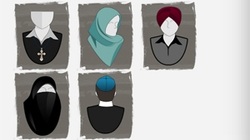 http://www.nosvaleurs.gouv.qc.ca/en/propositions/3 http://www.nosvaleurs.gouv.qc.ca/en/propositions/3 The image to the left shows symbols that would not be allowed under the charter. The main reason given by the government is to affirm the equality of men and women and to unify the people of the province. According to the government, " This restriction would reflect the state’s neutrality. "
What message is the cartoon conveying? How is it linked to liberalism? The source is trying to say that when a government action interferes with people's individual rights to express their beliefs, it is wrong. Rights are more important than values. It relates to the principle of individual rights and freedoms, which is a key principle of liberalism. Values, especially collective values, are not identified as a principle of liberalism. The source also relates to the collectivist principles of collective interest and collective responsibility.
The Charter promotes equality. No one should promote their own personal beliefs when they provide a government service. By doing so, the Charter interferes with individual rights. It tells people of all religions they have to put their beliefs aside when they work for the common good as government employees. It also implies that women who wear head coverings as part of their religion are oppressed. They wear the hijab because their culture treats them as less than equal.
I can see both sides on this issue. On the one hand, I think everyone has the right to practice their own religion. But what if that religion discriminates against others? Or discriminates against women? What if it gets in the way of their work? If I was a Muslim student in a classroom where the teacher wore a big crucifix every day, will I think I am being understood? If my doctor wears a burqa, how can I read her face? This is an interesting dilemma for all Canadians. We are all about multiculturalism, and we think everyone is equal- even if it is equal but different. When you work for the government, you are supposed to be neutral. Just the other day, I went to get my drivers licence renewed. Our registries office is privately run and the people who own it are members of a fundamentalist sect. The office is full of religious tracts trying to convert people to their way of thinking. Should their beliefs be in my face when I go to receive a mandatory government service? Or should people check their religion at the door when they go to work?
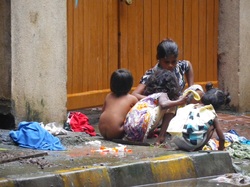 Pavement dwellers, Mumbai 2013. Pavement dwellers, Mumbai 2013.
Before I began my summer vacation, I marked diploma exams. Of the 300 or so papers I marked, only one of them mentioned India. And I realized we don’t really teach about India even though it’s a vital nation to look at, especially in terms of ideology, freedom and equality. You may have heard of India –the world’s largest democracy-as poster child for the liberalization of trade. It has had impressive growth rates over the last decades as it moved away from a socialist economy. I thought of it as a bit of a miracle myself until this summer when I travelled there for a month. I’m not an expert on the country, but it was a mindboggling trip that made me stop and think. Culturally and linguistically more diverse than the entire continent of Africa, India is faced with enormous challenges. Although the food is fabulous and although India ranks second in the world for agricultural output, 55% of India’s children suffer from malnutrition. It is home to one third of the world’s poor. What does “poor” mean? The government defines extreme poverty (experienced by 138 million of its citizens) as living on 44 Canadian cents a day. We know that no one in Canada could survive on that little money. Although things are definitely cheaper in India, even the cheapest meal costs 31 cents. There is a lot of debate about what poverty really means. Economists say they have to keep that definition low, because if the definition was changed, the government would have to provide subsidies to 2/3 of the entire population. There is a great deal of disparity in India. Slums beside elegant apartment complexes; luxury SUVs drive alongside rickshaws; pavement dwellers live on sidewalks just meters away from upscale hotels. In his novel Shantaram Gregory David Roberts talks about the great freedom of India, suggesting that it’s great that the poor are free to live right beside the rich. But to my mind, if the rich see the poor living right beside them, wouldn’t they want to do something about it? That doesn’t seem to be the case as income disparity has doubled over the past 20 years. Everywhere I went I saw men. Men lined up at security checkpoints. Men in museums. Men working in stores and hotels and farms. But women? Not so many. Although female infanticide and gender-selective abortion are illegal, there are presently 37 million more men than women in India. Most of these girls are aborted before birth; others are mistreated and malnourished to the point that in the 0-6 age group, there are 7 million fewer girls than boys. Look at the website 50 million missing, founded by activist Rita Banerji, who graciously donated some of her photos for use in this course. India is a beautiful country filled with spectacular natural beauty and fabulous buildings. Its people are warm and friendly. It’s an amazing place to visit. It’s even more interesting look at from the perspective of liberalism. In the case of freedom and equality, India shows they do not always go hand in hand.
The inherent vice of capitalism is the unequal sharing of blessings; the inherent virtue of socialism is the equal sharing of miseries.
Winston Churchill
The video below graphically demonstrates the growing inequality in the United States. While Canada does not have this degree of income inequality, it is moving in that direction. Under our current economic system, we see a greater and greater divide, not between the rich and the poor, but between the extremely wealthy and everyone else.
Are the extremely wealthy in their position because they are more clever with their money, they want wealth more, or somehow deserve to be richer than everyone else? Or is it because they work so much harder? 380 times harder?
Is income inequality the inevitable outcome of capitalism? What about the idea of trickle down economics, or Adam Smith's theory of the invisible hand?
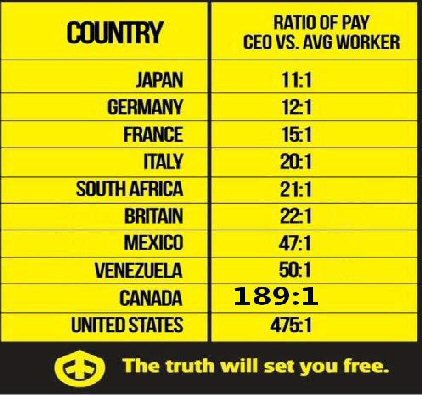
http://www.canadiansocialresearch.net/images/ceo_income.jpg
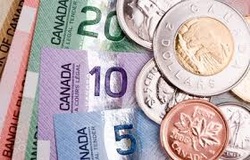 What do Canada and Germany have in common? Besides winter, a love of beer, and parliament buildings, what does Canada have in common with Germany? A Triple-A credit rating, that’s what! A credit rating is an estimate of your ability to pay back your debts. Credit ratings are given to individuals when they apply for loans, and they are also given to nations by credit rating agencies to show how reliable they will be in paying off their debts, based on their previous actions. The highest credit rating available is a Triple A rating. On February 22, the United Kingdom had its credit rating downgraded. The United States and France have both had their rating downgraded recently, leaving Canada and Germany as the only two remaining western nations with a Triple A rating. What does that really mean? A credit rating is an indication of financial health and prospects for the future. Having a high credit rating means that more people will be likely to invest in your nation as it's seen as a safe bet. Credit rating agencies don’t like debt. They like to see governments making an effort to curb their spending and increase their earning of income. What would it mean for an economic system to be completely free? Would there be credit ratings? Would there be controls on debts and investments? The economies of Canada and Germany survived the economic crisis of 2008 better than many nations, partly due to their more regulated economies. Canada is apparently doing pretty wel, although some reporters feel our days are numbered. If our economic growth continues to slow down, we could be the next nation to lose that favoured status.
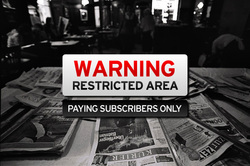 Freedom of speech is essential in a liberal democracy, and indeed an informed citizenry is critical to the functioning of a democracy. But is information in countries like Canada free? Or is it controlled by publishers for their own profit? The recent suicide of internet activist Aaron Schwartz has brought the Open Access movement back into the news, but as this recent article in al-jazeera points out, freedom of access to scholarly articles is about more than just being able to read a news article or a paper published by an academic researcher free of charge. It can be a life and death issue for people in less free nations. The article describes how the government of Uzbekistan created a fictional terrorist group in order to justify the shooting of civilian protesters. Yet the first article published about the event was posted behind an academic firewall- that is, posted in a journal that only people affiliated with a university could access. Scholars receive no money for these articles- the only profit goes to the website publishers. So the article was also published in an open access journal where it has since been used to help obtain freedom for political refugees.
Aaron Schwartz downloaded articles from JSTOR, an academic digital archives at MIT, because he believed information should be free. Before he committed suicide, he faced 4 million dollars worth of lawsuits and 30 years in jail .
Yes, it costs money to produce websites such as JSTOR. But who owns information? If knowledge is power, who should control it? What is the price of freedom?
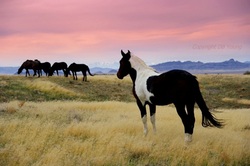 Have you ever lost a friend or got into a fight with a family member because of your beliefs? What about your ideological beliefs? A friend of mine recently told a prospective boyfriend, "There's something you should know about me before we take this any further. I'm pretty sure I'm a liberal and if that's going to cause problems for us down the road, we need to end this thing right now." Sound crazy? Maybe not! According to a survey done by neuropolitics.org, most people do consider political beliefs as a criteria in mate selection. I guess that does make sense as people tend to marry others like themselves. Do you really want to spend your life disagreeing about major issues with your partner?
If you believe in something, you're going to stand up for it. If you really think you are right about an issue, you might try to convince others that they are wrong. But where do we draw the line in our human relationships? Would you move out of the house because you and your mom voted for different candidates? Would you refuse to serve food to a friend because he was a Conservative and you planned to vote Green? This podcast from " This American Life" tells the story of how political beliefs can ruin friendships and family life and suggests some strategies to overcome that problem. Taking the opposite view, when uncle died, my aunt told me that after his death, she discovered they had been effectively cancelling one another's vote for the past 50 years. What do you think? How much does ideology influence your identity? Would you choose or reject a life partner based on ideological belief?
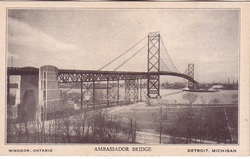 The 83 year old Ambassador Bridge between Windsor Ontario and Detroit Michigan is the busiest bridge in North America, accounting for 25% of the traffic in trade between Canada and the United States. It’s owned by an 85 year old American billionaire named Matty Moroun who makes $80 million a year off tolls and selling duty free gas and goods and even more from the sale of gas at the border, and his fleet of trucks that use the bridge to transport automotive parts back and forth across the bridge. The Canadian government wants to replace the bridge with a new one, which it will pay for. If you lived in Michigan, wouldn't you think that was a good idea? Economists call it an "amazingly sweet deal" for the people of Michigan. Moroun, however, is lobbying heavily for the people of Michigan to vote against the bridge . “Nothing is free” they are being told. Despite the fact that the Canadian taxpayers will foot the bill, the message is that “Someday, your grandchildren will be on the hook to pay for that bridge.” As a lobbyist, Maroun is using his extensive finances to back his campaign to continue to have a monopoly over bridge traffic.
At the heart of the Ambassador Bridge story is ideology. What best serves the common good? Tax-payer funded infrastructure that everyone pays for and everyone gets to use? Or privately owned services from which a handful of people profit? And how do we balance the common good with economic freedom? Should an individual have the freedom to benefit from control of an essential service ?
|
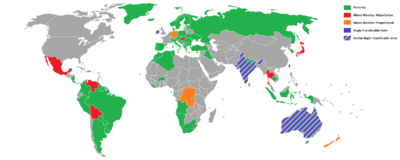
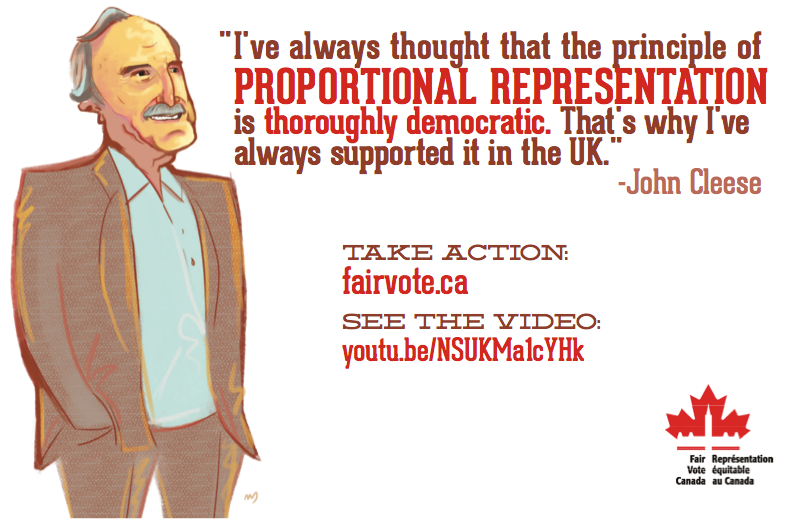

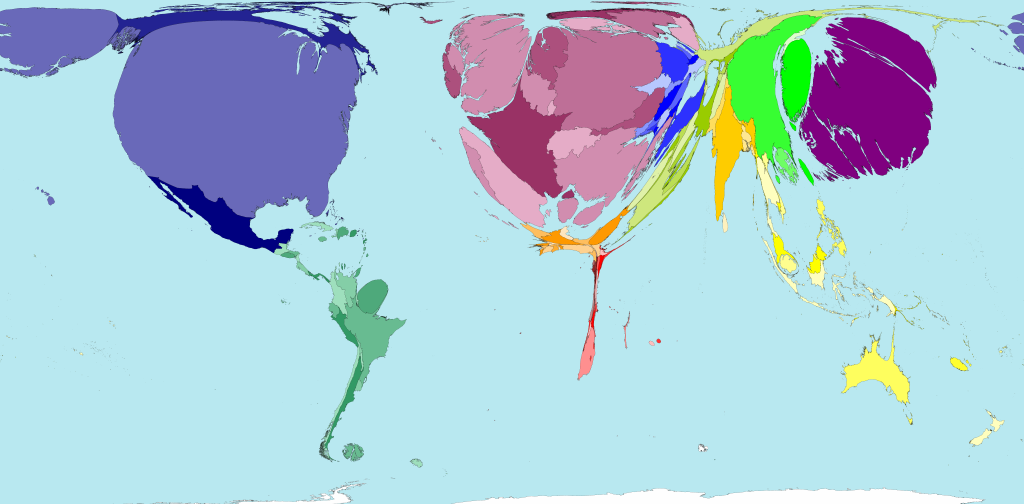









 RSS Feed
RSS Feed